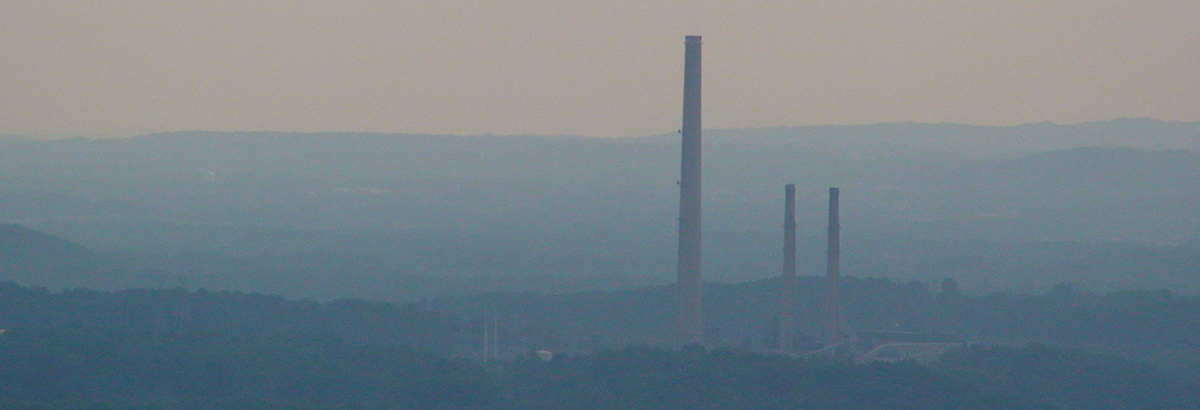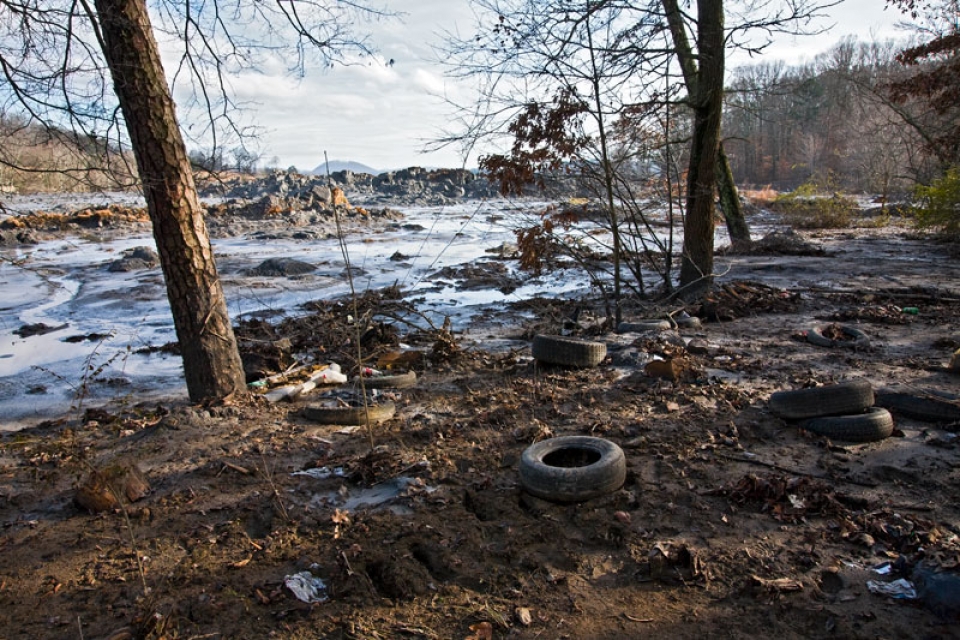
Coal is the dirtiest fossil fuel. It destroys our air, water and climate, from mountaintop removal mining in Appalachia to coal-fired power generation across Maryland. Studies have linked coal pollution to numerous health impacts, including asthma, lung cancer, heart disease, stroke and neurological damage. Scientists warn that we must keep two-thirds of remaining fossil fuels in the ground to prevent runaway climate change impacts. We simply must move off dirty coal to clean energy sources. CCAN is fighting on all fronts to move Maryland past coal. We’re pushing for stronger pollution controls in all coal mining, transport, processing and export facility permits, fighting for the strongest protections in the country on coal ash waste and finally shutting down the state’s dirtiest coal plants.
Get Involved: Join the Movement as an Action Member
Shutting Down Dirty Coal Plant Pollution
In Maryland, six coal-fired power plants generate about 40 percent of electricity. We work to transition the state to cleaner energy alternatives to protect our residents’ health and our climate’s stability.
Retiring dirty coal plants
By forcing existing coal-fired power plants to adhere to the strictest pollution standards possible, CCAN accelerates the shutdown of some of the dirtiest polluters and helps Maryland move past coal. CCAN and the Environmental Integrity Project won a major victory to shut down the R. Paul Smith coal-fired power plant in Williamsport in September 2012. In December 2013, NRG Energy announced plans to shut down the Dickerson and Chalk Point coal-fired power plants, located in Montgomery and Prince George’s Counties respectively — but the company has since gone back on this plan.
Enforcing strict pollution standards
CCAN works on strengthening and enforcing air and water pollution regulations on coal plants through permits and enforcement actions.
Coal plants have to obtain air and water pollution permits that outline minimum environmental standards for the discharge of pollution. A rigorous review process including stakeholders and community members determines these permits’ renewal every five to ten years. The state agencies issuing the permits must provide the public a meaningful opportunity to review and comment on them. They may also host a public hearing to engage face-to-face and hear concerns from impacted community members. Public participation makes a big impact on the development of a strong pollution permit, which is why CCAN helps facilitate community involvement in this process.
Water Pollution
In 2015, the Environmental Protection Agency (EPA) under the Obama Administration issued strong new rules called Effluent Limitation Guidelines (ELGs). They limited the amount of toxic emissions from coal-fired power plants that could be discharged into waterways. In 2018, the EPA under President Trump revised the compliance deadline for the rules.
Meanwhile, the permits for three Maryland coal plants were up for renewal. These included Morgantown Generating Station in Charles County, Chalk Point Generating Station in Prince George’s County and Dickerson Generating Station in Montgomery County, all owned and operated by GenOn Energy of Atlanta (except for Chalk Point, which is owned and operated by NRG). CCAN put pressure on the Maryland Department of Environment (MDE) to make the new water pollution permits as strong as possible. We turned out residents to public hearings and submitted hundreds of public comments. We called on MDE to uphold the strong limits set out by the Obama Administration rules. MDE can include these Obama-era limits on toxic pollution in the water permits the agency issues.
And we won! For all three coal plants, MDE issued water permits that were very strong. The coal plants now have to drastically reduce their release of toxic metals into the Potomac and Patuxent Rivers starting November 1, 2020. They are required to install pollution control measures that are estimated to reduce contaminants such as arsenic, mercury and selenium by up to 97 percent. As far as we know, Maryland is the only state to implement the strong limits in the Obama-era rule.
GenOn/NRG are suing MDE, asking state courts to delay the implementation of these strong permits, which will further pollute these rivers. CCAN, represented by the Environmental Integrity Project, has intervened in the lawsuit to defend MDE’s decision.
Air Pollution
Nineteen coal plants in Indiana, Kentucky, Ohio, Pennsylvania, and West Virginia emit pollution that contributes to smog problems in Maryland. These plants’ nitrogen oxide (NOx) emissions — the basis of ozone and smog — harm public health by causing or worsening asthma. They can also lead to algal blooms that harm our treasured waterways, including the Chesapeake Bay.
Uncontained out-of-state NOx pollution causes several regions in Maryland to have ozone rates that exceed federal air quality standards. MDE estimates that about 70 percent of Maryland’s ozone problem originates from emissions in upwind states.
Maryland’s attempt to work with these neighboring states on a voluntary basis failed, so we asked the EPA to intervene. In November 2016, Maryland submitted a formal petition to the EPA under section 126 of the Clean Air Act. This “Good Neighbor” petition asked the EPA to order 19 upwind coal plants to run existing NOx pollution controls properly so we can breathe cleaner air. Simply running this existing pollution control technology could result in up to 304 tons of NOx reductions in a single day.
But the EPA failed to respond to Maryland’s petition within the time period required by law. So Maryland sued the EPA to force a response, and CCAN intervened in support of Maryland’s lawsuit. Then in June 2018, the EPA announced its intent to reject our Good Neighbor Petition and formally denied the petition in October 2018. MDE is challenging the EPA’s decision to deny its petition and CCAN has intervened to support MDE’s petition.
Cleaning Up Coal Ash in Maryland
 Burning coal leaves behind a toxic by-product called coal combustion waste, or what is more commonly known as “coal ash.” Coal ash contains high levels of heavy metals like arsenic, lead, and mercury and has been linked to numerous health impacts including cancer, lung disease, respiratory distress, and neurological damage. Coal ash has a history of leaching heavy metals into drinking water supplies and neighboring water bodies. This is no small problem: the EPA estimates that 140 million tons of coal ash is generated annually – the second largest industrial waste stream in the U.S.
Burning coal leaves behind a toxic by-product called coal combustion waste, or what is more commonly known as “coal ash.” Coal ash contains high levels of heavy metals like arsenic, lead, and mercury and has been linked to numerous health impacts including cancer, lung disease, respiratory distress, and neurological damage. Coal ash has a history of leaching heavy metals into drinking water supplies and neighboring water bodies. This is no small problem: the EPA estimates that 140 million tons of coal ash is generated annually – the second largest industrial waste stream in the U.S.
According to a report by the Environmental Integrity Project and Earthjustice, 91 percent of coal ash sites nationwide have unsafe levels of at least one pollutant from coal ash in the groundwater.
In Maryland, CCAN has been fighting to force the cleanup of three coal ash landfills polluting groundwater and nearby streams. These include the Brandywine landfill in Prince George’s County, the Faulkner landfill in Charles County and the Westland landfill in Montgomery County, all owned by NRG Energy, a subsidiary of GenOn. The Brandywine landfill in Prince George’s County is in the top 10 — ranked as the seventh-most-contaminated out of 265 sites across the country.
We are now working with the University of Maryland Environmental Law Clinic and other organizations to make sure the regulated coal ash sites in Maryland are complying with federal and state requirements.
Historic Settlement Holds Major Polluter Accountable for Defying the Clean Water Act
In January 2013, CCAN and our allies at Defenders of Wildlife, the Sierra Club, and the Patuxent Riverkeeper won a three-year legal fight to force GenOn (formerly Mirant) to clean up its three coal ash landfills in Maryland, which had been cited for hundreds of violations under the Clean Water Act. Our organizations helped to negotiate one of the strongest coal ash settlement agreements in the country. GenOn has agreed to pay $2.2 million in penalties. Additionally, it will clean up its Maryland landfills to ensure they do not pollute local waterways in the future. Finally, nearby residents will get the protections they deserve from toxic coal ash pollution. To read the entire consent decree, click here.
Now, we are working to ensure that other coal plants follow suit.
TAKE ACTION
Click HERE to join our email list to stay updated on ways to move Maryland past coal.
If you live near a coal plant, we’d love to hear your story. Email denise@chesapeakeclimate.org to learn more.
Key Articles
- “Maryland Limits Coal Pollution In Potomac, Bucking Trump EPA,” WAMU, 8/22/18
- “Six U.S. states sue Trump’s EPA over interstate smog pollution rule,” Reuters, 1/31/19
- “One Of The Most Polluting Coal Ash Dumps In The U.S. Is In Maryland,” WAMU, 3/4/19
- “In Maryland, one community is taking a stand against environmental racism,” Grist, 7/27/16
RESOURCES
- Environmental Integrity Project Report: “First Comprehensive, National Study of Coal Ash Pollution Finds Widespread Groundwater Contamination.”
- Factsheet: Exporting Coal – Exporting Climate Change: The threat of increasing coal exports from the East Coast.
- Profiles: The Costs of Coal Exports: Stories from Communities Living in the Path of Coal Export Terminals.

